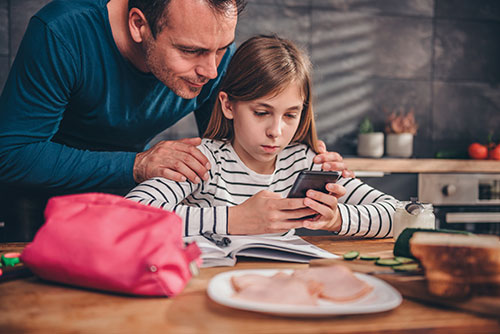Keeping the Lines of Communication Open on Social Media
 When it comes your child's use of social media and technology, it's important to talk about privacy and safety concerns, such as cyberbullying and phone use that can distract from other activities (at school or while driving). Here are just a few topics to help get your conversation started!
When it comes your child's use of social media and technology, it's important to talk about privacy and safety concerns, such as cyberbullying and phone use that can distract from other activities (at school or while driving). Here are just a few topics to help get your conversation started!
-
What is fun about using social media? What social media apps would you want and what do you like about them?
-
What types of things would you like to post? Pictures?
-
Who would you allow to follow you on social media? How do you decide if someone should follow you?
-
What do you do if someone you do not know contacts you or asks to follow you?
-
What information should you share online? What information should you not share online? How do you keep your information private?
-
How would you respond if someone who made a mean comment to you online? What if that person was a friend? What would you do if someone was posting hurtful things about you or a friend?
-
What kinds of problems can result from hurtful, negative or mean social media posts?
-
What unsafe or dangerous situations could happen if you made your profile and personal information available to everyone?
Make It More than a One-Time Discussion
Maintaining an ongoing dialogue with your child about his or her social media/technology use and habits is essential to ensuring your child's safety and providing you with peace of mind. This section provides valuable advice on how to do that.
Talk early and often. Start a conversation around social media as soon as you can. It can be more challenging to talk about your expectations and rules if children already have phones and are set in their own social media habits. Consider the timing of your child's social media-related chats, and make social media part of regular, everyday conversations. A tone of curiosity, reflection and openness in your comments and responses will support a continued, open conversation. When talking about posts and online comments, encourage children to think before posting by asking themselves questions like: Why is it important to me to post about this topic? What is the value in posting about this? Will I feel good about posting this later today or next week?
Expect mistakes and use them as teaching opportunities. Even when parents set realistic expectations for their children's online behaviors, children will still make poor decisions. The best way to help children learn from their mistakes is for parents to state the preferred or expected positive behavior, help their children practice it and give consequences.
Responding to mistakes. When your child makes a mistake with social media, you might feel compelled to restrict all access. Instead, consider using task-based consequences, which involves removing access to social media privileges and requiring your child to complete a task in order to earn back access. The task could be doing a household chore, mowing a neighbor's lawn, etc. Privileges are restored after your child completes the task, identifies the error and describes how he or she will handle similar situations in the future.
Catch your child being good. Your child may make more “good" choices than “bad" choices with respect to social media use. Be sure to recognize those good choices by praising your child for doing the right thing and following agreed-upon rules and expectations.
Be a positive role model. How do you use your own devices? How often are you on your phone? Do you scroll through social media at dinnertime or in the middle of a conversation? There are many perfect times when you can model appropriate social media use to your child. Since children are always watching, take advantage of opportunities to discuss your own social media presence by setting a positive example in your online posts.
Explore social media together. Since you're in control of the content you'll be looking at with your child, you can selectively view a variety of different sites and social media outlets without getting into inappropriate or dangerous areas. This creates a good opportunity to discuss potential dangers with your child. Ask questions about the games, people, sites and YouTube channels your child enjoys. Join with your child by visiting these sites together.
Let your child earn more leeway. As children follow your agreed-upon rules and meet your expectations, you can consider giving them greater independence on social media. You could say something like, “I will be checking in less often since you have kept our agreement for the past few months." As you make changes and grant more independence, you can expect them to exhibit greater responsibility. You might also adjust consequences for mistakes as your child gets older.
You can prevent many problems through ongoing communication, monitoring and making yourself available to talk. Children feel respected when their parents are open to hearing different perspectives, including theirs. Parents who respond calmly, even when they have to give a consequence for their children's poor choices, are more likely to have open communication with their children about social media.
Additional Resources
- commonsensemedia.org
- internetmatters.org
-
The Art of Screen Time by Anya Kamenetz
Download Printable Version
Kid Tips;Social Media;The Digital Age;Screen Time
